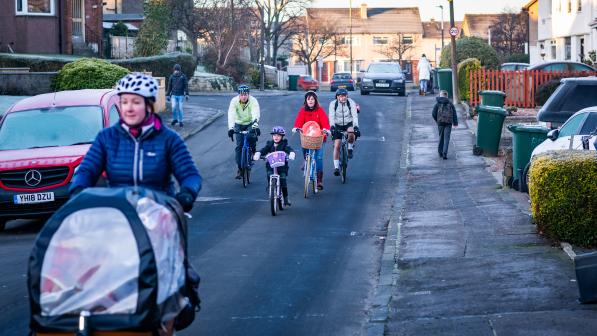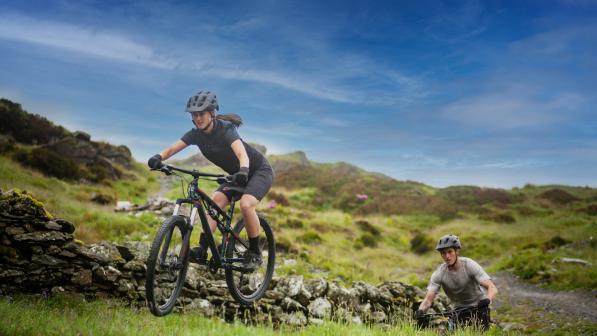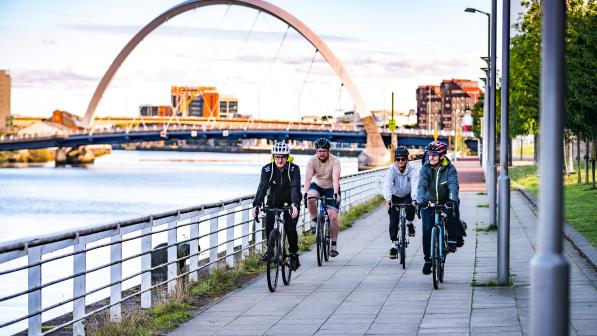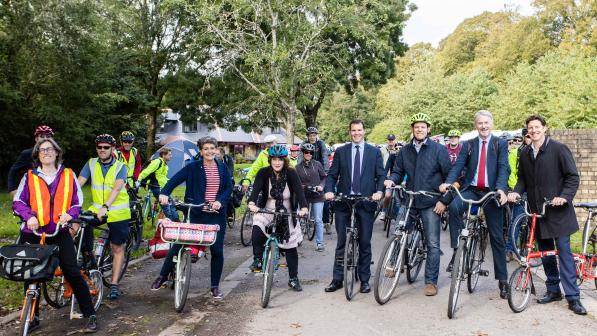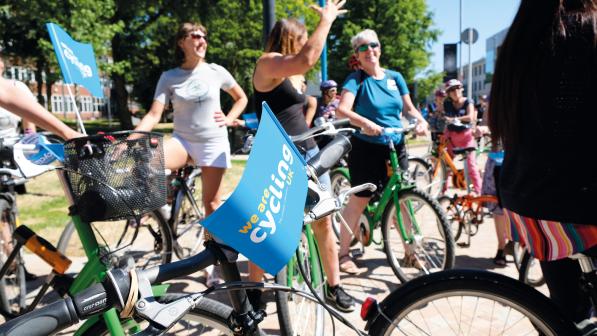What did Cycling UK's campaigns achieve in 2021?

One of the most exciting aspects of 2021 has been continuing to build our capacity for campaigning and engagement in all four nations of the UK.
We’ve been able to strengthen relationships with partner organisations and political allies to grow a more unified voice for cycling and active travel, which will prove invaluable next year when we’ll have elections in all four nations.
Skip to highlights from:
UK-wide England and Wales England Wales Scotland Northern Ireland
UK-wide

COP26: This machine fights climate change
The COP26 climate summit in Glasgow was one of the big events of this year. Before the conference began, Cycling UK highlighted that cycling had been excluded from the agenda in favour of discussion on electric vehicles and charging points. We used eye-catching projections to shine a light on an overlooked zero-emission vehicle: the bicycle.
Ahead of Transport Day, Cycling UK joined with hundreds of other organisations in signing an open letter to government leaders at COP26 calling for cycling to be recognised. Finally, a last-minute intervention by a delegate from the EU saw recognition of the role of active travel included in the text.
Jim Densham, Cycling UK’s campaigns and policy manager for Scotland has written up his thoughts about what COP26 achieved for cycling .
Now that COP26 is over, Cycling UK is shifting campaigning focus from global to local. Join us and use our online tool to send a letter to your council’s transport lead (or MLA in Northern Ireland) and ask them what they're doing to enable more people to cycle and reduce transport emissions.

Election campaign leads to increased active travel funding
May 2021 brought us national elections in Scotland and Wales, and local elections in England.
Every party promised to boost the funding for active travel, which was hugely positive and helped by more than 3,000 of you who signed our petition, asking parties to support our manifesto asks.
We had a lively campaign for cycling in the run up to the Senedd election in Wales – our first bilingual manifesto, lots of supporter involvement, and an excellent active travel hustings, where politicians from all parties said the thing we all most wanted to hear – that cycling should be for everybody!
In Scotland, the resulting SNP and Scottish Greens coalition set out a Programme for Government which committed the Government to 'spend at least £230m, or 10% of the total transport budget, on active travel by 2024-25' – one of Cycling UK’s main asks. December’s budget contained a record £150m for active travel.
Before the local elections in England, 515 politicians took our pledge to ensure that cycling is accessible for everyone, and of those, 130 were elected.
Next year, we’ll be embarking on another round of election campaigning – this time for local elections in Scotland, Wales and England, and national elections in Northern Ireland.
We’ll be producing information, shared messages and resources to support local campaign groups across the four nations to ask their candidates what they’re going to do about improving things for cycling. To stay updated, connect with our Cycle Advocacy Network.
Connect with the Cycle Advocacy Network

Highway Code success
Last year, 16,500 people supported Cycling UK’s call for better protection for vulnerable road users in the GB Highway Code, and now we’re seeing the impact of that unified voice.
Our key asks, in response to the Highway Code Review, related to:
The Department for Transport confirmed that the first three of these will be included in the new Highway Code, while we understand that the fourth will also be added, representing a huge success for cycling, walking, and road safety - thank you to everyone who supported the campaign.
There’s still a long road ahead to ensure these changes are well communicated and understood by road users, so keep your eyes peeled for opportunities to get involved.

Cycle champions speaking up for cycling
October marked a year since we launched the revamped Cycle Advocacy Network. During its first year over 200 volunteers have joined CAN as local representatives of Cycling UK.
We’ve had virtual gatherings, new resources and surgery sessions, and it’s been great to see local reps linking up on the CAN forum and supporting each other with their ideas and shared experiences.
This year we introduced a new way to connect with CAN, by signing up as a Cycle Champion to receive campaign action ideas and invitations to future online events – however much or little time you have available.
Too Close for Comfort: national day of action
On 14 April, the first ever national day of action on close passing saw 40 police forces from across the UK coordinating live operations and online messaging to tackle close passing, as part of a wider fortnight of action on road safety for cyclists and motorcyclists.
We took this opportunity to recognise the legacy of the West Midlands Police officers who pioneered the first close pass operation over four and a half years ago.
England and Wales
Road justice and the Police, Crime, Sentencing and Courts Bill
The Government has finally committed to carrying out a review of road traffic offences and penalties, which Cycling UK has been calling for for many years. It first promised this in 2014, but then carried out a much more limited review, focused on just three proposals that are now contained the Police, Crime, Sentencing and Courts Bill which is now before Parliament. However, thanks to sustained pressure in both the Commons and the Lords over the inadequacies of the Bill's proposals, the Government has recently conceded that it will conduct a call for evidence on parts of the Road Traffic Act. We’ll continue to press for clarity on the timescales and scope of this review.
The Department for Transport (DfT) is also considering how best to set up a Road Collision Investigation Branch, and we await the outcome of its Roads Policing Review. These were both things we pushed for in our report Cycle Safety, Make it Simple.
England

Holding councils to account
It has been quite the ride since West Sussex County Council chose to remove the cycle lane on Upper Shoreham Road in November 2020. Cycling UK brought its initial challenge in February 2021 which was refused by Mr Justice Lane in May. We then stepped up the fight and appealed the decision.
Finally, on 25 -26 January 2022, the High Court will have the opportunity to rule whether the council’s decision to remove the cycle lane on the Upper Shoreham Road was unlawful.
But judicial review is expensive, especially as we have had to go to appeal and fight so hard. We are truly grateful for all the support so far, many of our members and supporters have already donated and it’s thanks to those contributions we have come so far.
Donate to the Cyclists’ Defence Fund

West Kernow Way route highlights Cornwall’s lost rights of way
In September we launched the West Kernow Way, a 230km bikepacking trail developed as part of the European Regional Development Fund EXPERIENCE project. The route provides a snapshot of the problem off-road cycling faces across England, by including some short sections which are marked on the ground as public footpaths, or which don’t seem to be a right of way at all – despite a wealth of historic evidence that in the past they were used as public roads.
We hope that this route will bring to life the problem of ‘lost ways’ and inspire people to start researching historic rights of way in their area – before the 2026 cut-off date for them to be added to the map.
Planning for cycling
The UK Government is having a fundamental rethink of its initial proposals to reform the planning system in England, thanks to pressure from Cycling UK and our allies in the Better Planning Coalition. After facing the threat of some potentially very damaging planning legislation earlier this year, we and our coalition partners now feel there is a real chance of strengthening the planning system's role in tackling climate change, not least by ensuring that the location and design of new developments supports cycling and other forms of sustainable travel.
Reversing Humber Bridge closure
In April the Humber Bridge Board made a sudden decision to close the bridge to cyclists and pedestrians following a concerning increase in suicides – meaning a 60-mile detour for anyone unable to cross.
Cycling UK wrote to the Board pressing them to justify their decision, and following public pressure a month later the bridge was reopened to all users.
Wales

New Active Travel Act guidance
Cycling UK contributed to the consultation on the new Active Travel Act guidance published in the summer, and we’ve been encouraging people to feed into the production of their council’s Active Travel Map.

Access reform – one step closer, but more to do
After a long two-year process and several delays due to the pandemic, in the autumn Natural Resources Wales published its report outlining options for improving access in Wales, which the Welsh Government committed to do in 2019 following Cycling UK and OpenMTB’s long-running Trails for Wales campaign.
For representatives from Cycling UK and OpenMTB who have been involved in expert advisory groups to shape the proposals, the results are disappointing. Instead of making clear recommendations on the best way to progress with access reform, the report from Natural Resources Wales merely outlines the options and kicks the decision back to government.
We’ll be working on a next stage of the Trails for Wales campaign to make clear that the health and wellbeing benefits of improving access will only be achieved by implementing meaningful changes rather than sticking to the status quo. Sign up for our off-road updates to stay in the loop.
Scotland
Active travel given ‘national development’ status
The draft fourth National Planning Framework for Scotland includes a National Walking, Cycling and Wheeling Network as a National Development. In our Scottish Election manifesto we called for “an active travel network ‘blueprint’ for Scotland.... and designate the active travel network as a national development”. The national development designation gives the network a much greater status in local and national government prioritisation.
An improved Road Safety Framework
Our campaign on the Road Safety Framework for Scotland saw a large proportion of responses come from cyclists. This led to a number of improvements to the final Framework including the dropping of a controversial key performance indicator to measure helmet wearing.

Online system introduced to report dangerous driving
The Scottish Government has committed to supporting a camera footage reporting and submission pilot scheme for dangerous driving, following polling by Cycling UK which showed that the majority of Scots would support it. 33 organisations including the AA, the RAC and Cycling UK wrote joint letter to Police Scotland calling for system to be brought in.
Northern Ireland

Driving road safety forward
Cycling UK successfully bid for a share of the Department for Infrastructure’s £10,000 Road Safety Grant Scheme to create an online training course which teaches safe driving practices around people cycling. The course has so far been completed by over 400 people and received excellent feedback.
There are three short educational videos targeting close passing, car dooring and driver understanding of cyclists’ road positioning. The course is available for free to employers in Northern Ireland, which will help ensure their employees are skilled in safe driving techniques around people cycling.
A look ahead
We’ve spent much of the past couple of years asking national governments for more money for active travel. In Scotland and Wales at least, that argument has largely been won, even if England is still lagging behind. In 2022 we’ll be shifting focus from national policy and funding to local delivery of safe cycle routes.
As our engagement officer Gwenda Owen explains, “In Wales we have seen bold moves before, politicians with a passion and groundbreaking legislation in the Active Travel Act and Wellbeing of Future Generations Act and yet on the ground we still aren't getting many more people riding bikes.”
The first big challenge on the horizon will be building up to May, when we’ll have national elections in Northern Ireland and local elections across the rest of the UK. We want to grow and enable the Cycle Advocacy Network, to support local campaign groups across the four nations to ask their candidates what they’re going to do about improving things for cycling.
We’ll be pressing the Department for Transport to ensure that changes to the Highway Code are effectively communicated to the public, and we’ll continue to remind the Westminster Government of their commitment to a review of road traffic offences.
With the Welsh access reform recommendations published, we’ll likely have a third phase of the Trails for Wales campaign to demonstrate the public appetite for wider access to the countryside.
All of our campaigning is only possible because of the support of Cycling UK members, and the dedication of a growing network of cycling advocates across the UK.
Join Cycling UK and support our campaigns
